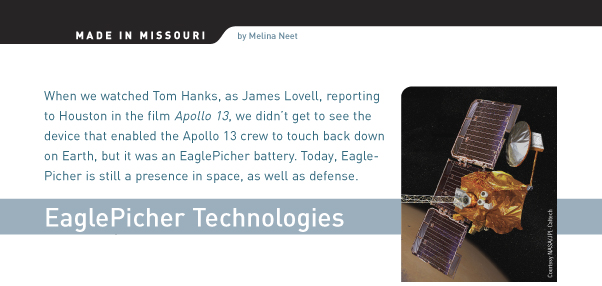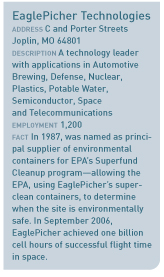

Primarily, we serve aerospace and military,” says Steve Westfall, President of EaglePicher Technologies. Eighty percent of Eagle-Picher Technology’s business is defense related. “On the military side, most of the batteries we make in Joplin usually  end up in missiles for missile programs; our satellite batteries end up in government satellites and in commercial satellites,” Westfall says. Also on the list: batteries for launch vehicles and submarines.
end up in missiles for missile programs; our satellite batteries end up in government satellites and in commercial satellites,” Westfall says. Also on the list: batteries for launch vehicles and submarines.
One such application is the “electro-explosives,” or “igniters,” which Eagle adds on to the batteries they produce for launch rockets. During both the Gulf War and the Iraq War, EaglePicher has been a presence, with its leading edge in battery technology.
“We’re very vertically integrated in our process,” says Westfall. “We make a lot of our own raw materials, our own piece parts, and then we make the end product, which has really kept us a strong player and really well positioned in the markets
that we play in. We don’t rely on external companies to supply our materials and parts.”
Eagle first formed as a lead and zinc mining company in Cincinnati, Ohio, in 1843, before moving to Joplin, where it has been for over 100 years. The discovery of germanium, a chemical element which is a semiconductor, led Eagle to begin mining it, as well. In 1947, Bell Labs made the first transistor, using Eagle-mined germanium. This early connection to the military usage of battery technology has grown; EaglePicher’s batteries are used in communication packs for military troops, part of the company’s ongoing effort to “support US soldiers and NATO soldiers in all activities in the world today.”
The company owes its longevity in Joplin to its presence in aerospace and defense industries. “We’re one of the top five employers in the city,” says Westfall of Eagle, which employs “roughly 1,200” of the community of 40,000. Modestly calling Eagle a “pretty good corporate citizen,” Westfall says that the company maintains healthy relationships with area schools and universities by sponsoring advanced students and hiring interns. Eagle is in the process of developing work-study programs with Joplin’s Missouri Southern State University, as well as the neighboring universities in Rolla, Columbia and Springfield.
Westfall, a Pittsburg, Kansas native, enjoys being able to positively impact Joplin and the entire state. He also looks forward to the development of a 30,000 square- foot state-of-the-art facility for lithium ion, to be used in Eagle’s aerospace and industrial applications. Westfall says the facility will also target “high-end industrial applications,” chiefly aviation.
In another three or four years, Eagle will mark its second billion hours in space. For the first billion hours, former astronaut—and onetime Eagle Board member—Buzz Aldrin was on hand. Westfall wishes aloud for the second billion-hour commemoration: “If we can get Buzz Aldrin and Neil Armstrong together, there you go!”